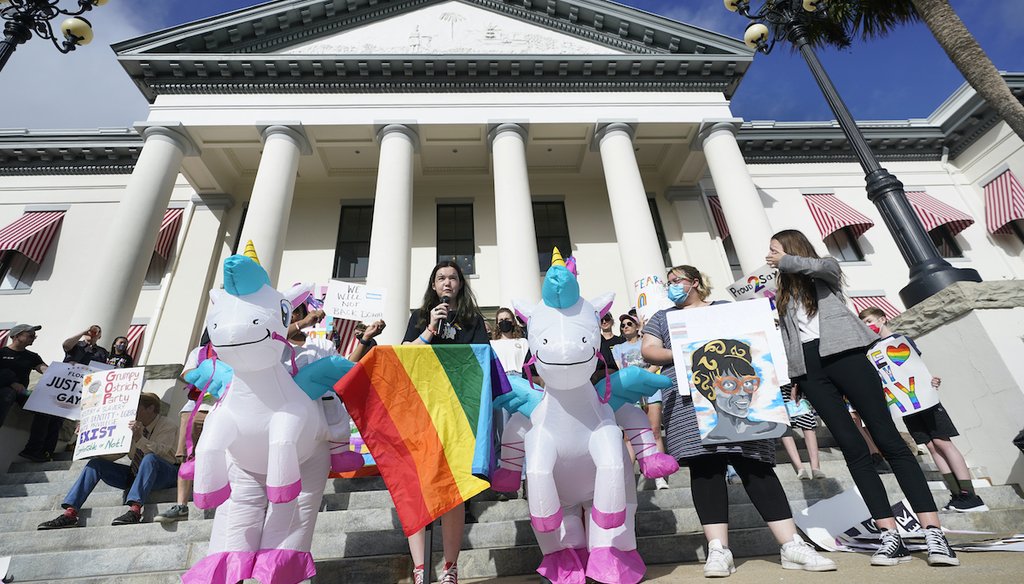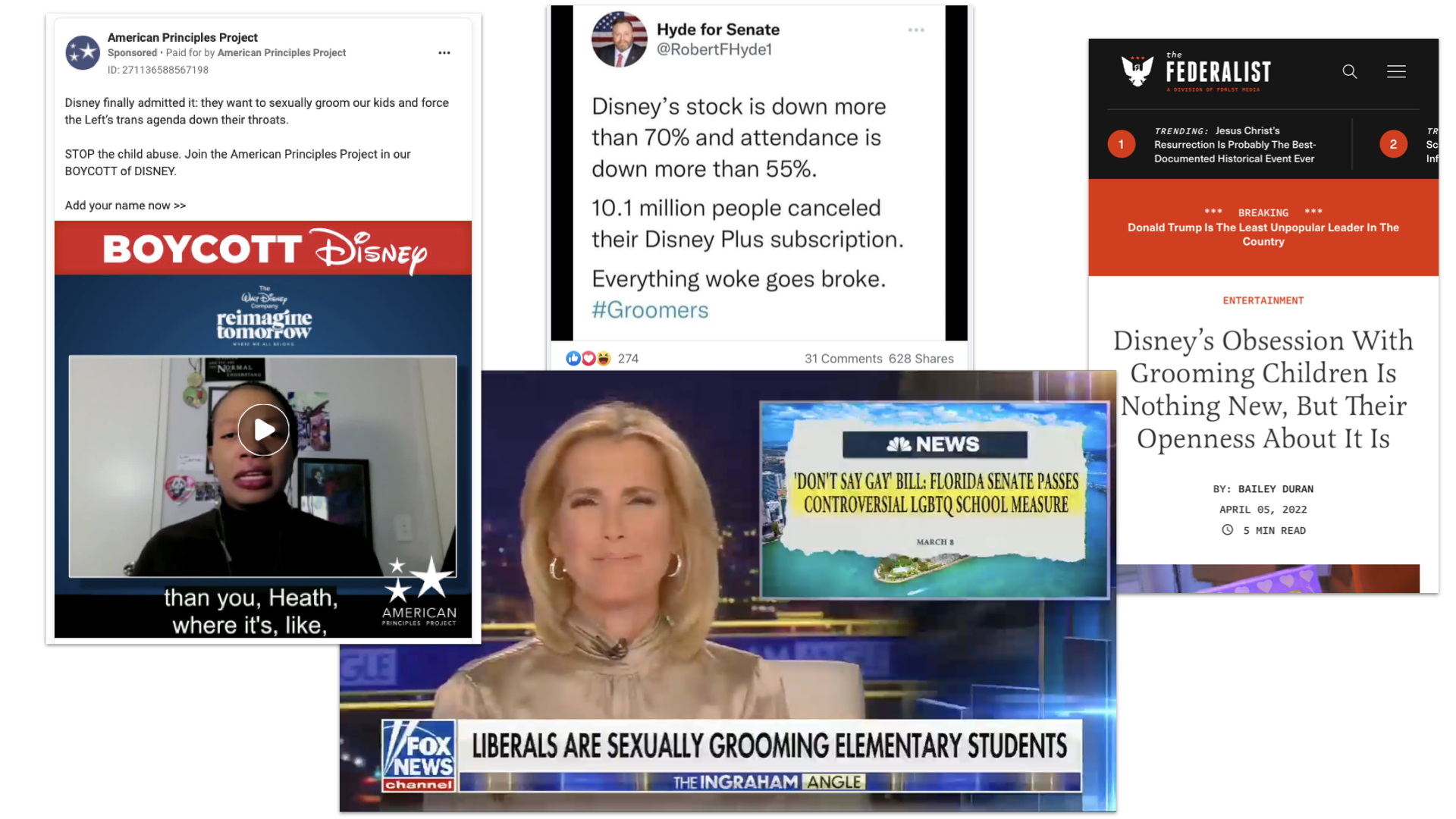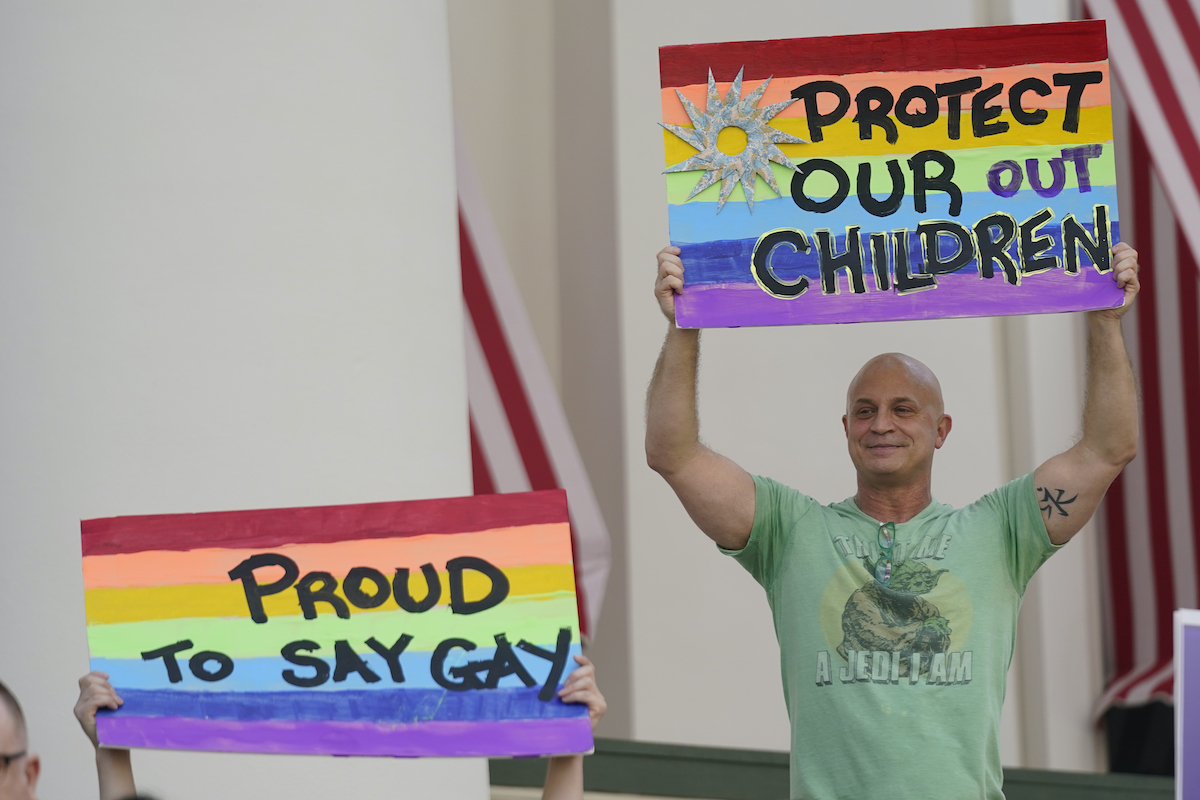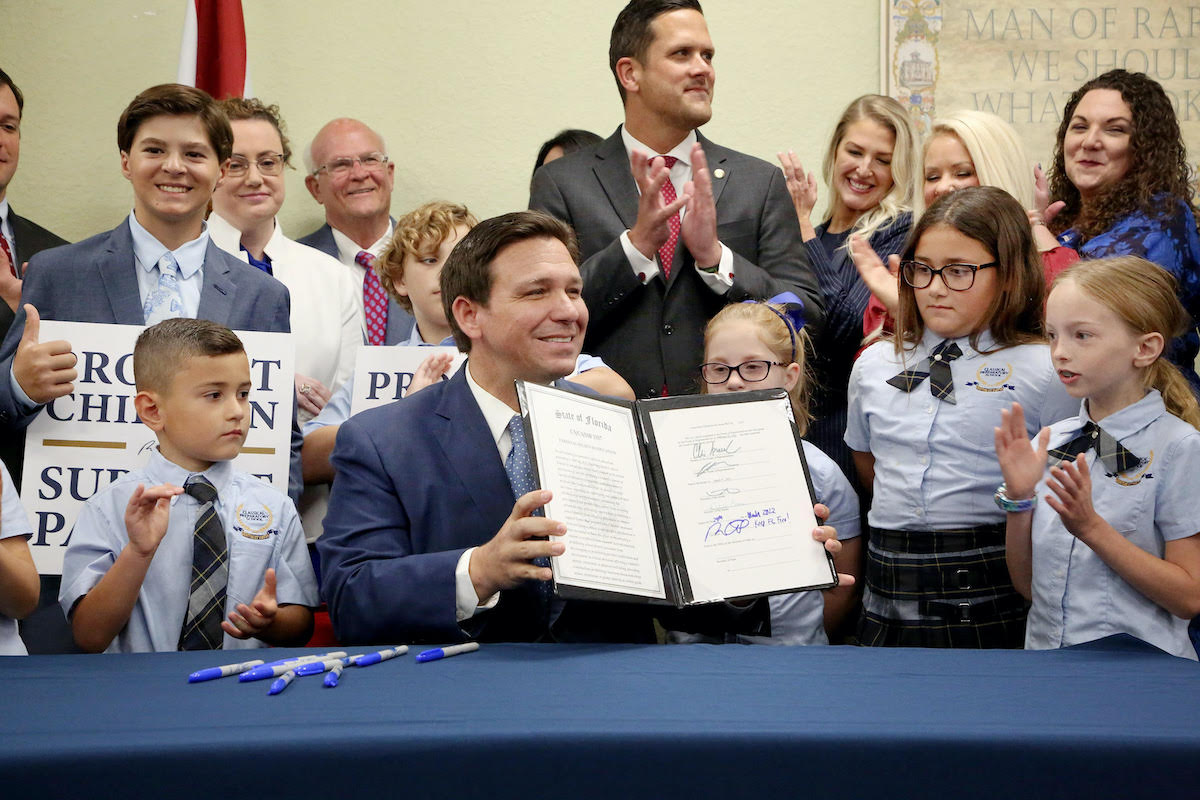Get PolitiFact in your inbox.

Demonstrators near the Florida State Capitol gather to speak against a bill that forbids discussions of sexual orientation and gender identity in schools on March 7, 2022, in Tallahassee. (AP)
If Your Time is short
-
“Grooming” is a term strongly associated with child sexual abuse; it refers to a process or set of behaviors adults use to make it easier to introduce and complete sexual interactions with a child.
-
Talking about gender identity and sexual orientation in the classroom would not be grooming, because it is done without intent to sexually abuse a child, experts said.
-
Experts in psychology and child development said they are not aware of any evidence showing that increased exposure to LGBTQ people or topics makes children more likely to join the LGBTQ community. Instead, they said it is likely an environment of increased acceptance allows people to more openly consider whether they might be part of the LGBTQ community.
Florida Gov. Ron DeSantis’ press secretary Christina Pushaw was not happy that critics had nicknamed a controversial Florida law the "don’t say gay" law.
She retorted by deploying a term that quickly became a political grenade of its own: "grooming."
"The bill that liberals inaccurately call ‘Don’t Say Gay’ would be more accurately described as an Anti-Grooming Bill," she tweeted in early March, referencing the measure, that prohibits classroom instruction on issues of gender identity and sexual orientation in kindergarten through third grade.
Our fact-checks disrupt the agendas of politicians across the ideological spectrum. Support the truth today.
For decades, the word "grooming" has been associated with sexual abuse — child sexual abuse in particular.
David Finkelhor, director of the Crimes against Children Research Center and sociology professor at the University of New Hampshire, defined it as "a set of behaviors and manipulations that adults use to make it easier to introduce and complete sexual interactions with a child, without having to use physical force."
Grooming might involve gift-giving, taking a child on special outings, focusing attention and compliments on appearance or providing a child with special privileges. It is typically aimed at one or very few potential victims, not a group.
What it does not refer to is the kind of activity that Florida’s measure now prohibits: instruction that touches on topics of sexual orientation or gender identity.
This narrative is rooted in past anti-gay movements. The weaponization of the term "grooming" is tied to a history of longstanding false claims that gay, lesbian and bisexual people — and men in particular — molest children at higher rates than people who are not LGBTQ.
Research shows that the idea is false.
Misusing the term "grooming" revives this old, harmful falsehood, experts said. But in the wake of Florida’s law, Pushaw and others have used the term to imply that people in the LGBTQ community — or even just those who discuss LGBTQ topics — are deliberately preying on children by discussing sexual orientation and gender identity. The suggestion is that these concepts force students to question their gender and sexual orientation, even if they otherwise wouldn't have.
"When did our public schools, any schools, become what are essentially grooming centers for gender identity radicals?" Fox News host Laura Ingraham said on her March 9 show. "As a mom, I think it’s appalling, it’s frightening, it’s disgusting, it’s despicable."

The word "grooming" has been used by Republican candidates, in political ads and on Fox News in recent weeks.
Jenifer McGuire, professor in the department of family social science at the University of Minnesota, said that perspective stems "from an underlying desire to separate people who are different and to characterize them as less than or as evil. So it’s a new form of homophobia and transphobia — or it’s maybe the same old form but with new language."
PolitiFact decided to consult experts and data to address the questions these "grooming" claims raise: What does research really say about children, LGBTQ topics and how they respond when they are exposed to gender diverse concepts? And how does that compare with data on grooming as it applies to child sexual predators?
In recent years, "grooming" has been used to describe the actions of people such as former USA Gymnastics doctor Larry Nassar, who sexually abused hundreds of gymnasts, many when they were children, and Ghislaine Maxwell, who was found guilty of several charges including sex trafficking a minor for her role in financier Jeffrey Epstein’s sex-trafficking ring.
Abusers employ grooming tactics to gain a child’s trust and often that of their family. They may share secrets with their victims. They often engage in casual physical contact before escalating it to something violating. They are commonly people who are already inside the child’s circle of trust. RAINN, an anti-sexual violence advocacy group, says grooming can take different forms and that there are a number of warning signs.
Credible research gives no indication that these behaviors are more often associated with people who identify as LGBTQ than those who do not. To the contrary, studies of child sexual abuse have revealed that most child molesters identify as heterosexual, according to the Zero Abuse Project. Abuse is about power, not sexual orientation or desire, experts say.
Charol Shakeshaft, a professor of educational leadership at Virginia Commonwealth University, studies sex abuse by adults who are employed in schools.
She said research undermines the idea that LGBTQ people working in school settings pose a significant threat to children. School employees who perpetrate child sexual abuse are most likely to be white, heterosexual, male adults, her work shows.
Gay, lesbian bisexual and trans people are less likely than people who do not claim those labels to commit child sexual abuse in school settings, she said. (Shakeshaft also said research has shown that most of the adults who target children of their same gender identified as heterosexual or were married or living with someone of the opposite gender.)
Teachers using gender inclusive reading material and lesson plans are not, by definition, grooming children. Nor is Disney by dropping gender-specific pronouns from park greetings or featuring movie characters who challenge stereotypical views of sexuality and romance.
"If we’re just talking to kids about gender identity and sexual orientation and issues like that, we’re not doing it with the goal of eventually sexually abusing a child," said Victor Vieth, chief program officer for education and research for Zero Abuse Project. "In fact, the goal may be to prevent sexual abuse because we know that children in the LGBTQIA+ community are at higher risk to be abused for a wide variety of reasons."
Another reading of the "grooming" narrative as Pushaw and Ingraham have applied it suggests that, over time, children might be taught to or coerced into claiming an LGBTQ identity as their own — even if they otherwise wouldn’t have. There is no evidence of that — and it points to a fundamental misunderstanding of human sexuality and gender identity.
Experts said they were not aware of any research or evidence that increased exposure to topics such as gender and sexuality makes people more likely to join the LGBTQ community. Instead, they said, it is likely an environment of increased acceptance allows children to more safely and openly think about, question and discuss their gender identity and sexual orientation.
Exposure to these topics "does not change the way people develop," said the University of Minnesota’s McGuire, who studies family relationships and gender identity and the health of transgender youth.
"It changes how they feel about how they develop," McGuire said. "Accepting parents don’t change whether or not their kid is trans — they change whether or not their kid hates themselves and gets kicked out of the house for being trans. The kid’s transness is there regardless."
Florida Gov. Ron DeSantis in March signed a bill that forbids instruction on sexual orientation and gender identity in kindergarten through third grade. (Douglas R. Clifford/Tampa Bay Times)
Clinton Anderson, acting chief of psychology in the public interest for the American Psychological Association, said thinking a child might somehow be persuaded to come out as gay or trans, for example, "is a misunderstanding of how sexual orientation and gender identity develop."
He said that different people have different levels of fluidity and variation, but a person’s sexual orientation and gender identity "are not easy things to change or alter."
"What we do know is it doesn’t look like there’s much that changes it externally," Anderson said. "The changes that happen seem to happen naturally because of how people develop — not because something is being done to them."
Survey studies show that an increasing number of people identify as gay, lesbian, bisexual, transgender or nonbinary. Gen Z adults, those born between 1997 and 2003, seem to be driving the increase, according to a recent Gallup poll. But Anderson and McGuire both said that such an increase doesn’t mean there are significantly more LGBTQ people.
"I’ve not seen any evidence to suggest that a safer environment makes people more gay or more trans," said McGuire. "I would expect that what it does is allow people to talk more openly about it — and I have seen evidence about that."
There is limited historical data on the LGBTQ community because it was rarely collected and it was often unsafe to disclose such information. People’s identities sometimes vary throughout their lives, which adds further complexity.
For hundreds of years, McGuire said there was overwhelming social pressure not to claim LGBTQ identities, meaning that "only people who simply could not not claim their identity would claim it." Now, she said, "there’s more room for people who are maybe not as binary in their thinking about their identity to own an identity."
Anderson said that the increase that is documented is probably driven, in part, by people choosing to claim an LGBTQ identity — even if they could conceal it if their safety required it.
"People who come out are finding acceptance, and that makes it easier for them to find where they feel comfortable in terms of sexuality or gender," he said. "But those people are not necessarily people who wouldn’t be gay or lesbian, they just would not be admitting it."
Misusing the term "grooming" can prevent the identification of actual grooming behavior and allow abuse to go undetected, said Shakeshaft who studies child sexual abuse in educational settings.
What’s more, misappropriating the term as a means to keep LGBTQ topics out of the classroom can be harmful to all children, regardless of their own sexuality or gender identity, experts said.
"Even for kids who are not LGBT identified themselves, they may very well have people in their lives who are LGBT identified, and having that exposure can make them feel safer around their own family," McGuire said.
It’s too early to have information about the impact of the Florida law on students.
But evidence shows that for LGBTQ youth, a positive, inclusive school environment is beneficial and can mitigate the negative impact of less accepting environments at home or elsewhere, she said.
Compared with youth with no or few staff members whom they believed were supportive of LGBTQ students, LGBTQ students with 11 or more supportive staff at their school had higher GPAs and were far less likely to miss school because they felt unsafe or uncomfortable, according to the findings of a 2019 National School Climate Survey conducted by GLSEN, a national education association that works to ensure students are able to learn in a school environment free from bullying and harassment, regardless of their gender identity or sexual orientation.
Similarly, a 2021 national survey of nearly 35,000 LGBTQ youth ages 13-24 showed the impact a supportive community has on youth mental health.
Forty-two percent of those surveyed said they had seriously considered attempting suicide in the past year, including more than half of transgender and nonbinary youth. But youth who said they "had access to spaces that affirmed their sexual orientation and gender identity" reported lower rates of attempted suicide. And rates were cut in half for those nonbinary and transgender youth who said their pronouns were respected by all of the people they lived with compared to those who reported their pronouns were not.
Still, even without acceptance or inclusion, LGBTQ people have existed "across enormous barriers," throughout history, McGuire said.
"LGBT people have tolerated massive abuse in this society and in others, and continued to exist in the face of that massive abuse," McGuire said. "A more accepting environment doesn’t make you more likely to be LGBT, it just makes you less likely to get abused."
PolitiFact researcher Caryn Baird contributed to this report.
RELATED: ‘Don’t say gay’ vs. ‘parental rights': Fact-checking claims about Florida’s HB 1557
UPDATE, May 12, 2022: Jennifer McGuire was recently promoted to full professor. This story has been updated.
Our Sources
Interview with Victor Vieth, the Zero Abuse Project’s chief program officer for education and research, April 18, 2022
Interview with Kathryn Olmsted, history professor and interim chair for the gender, sexuality and women's studies department at the University of California, Davis, April 18, 2022
Interview with Jenifer McGuire, professor in the department of family social science at the University of Minnesota, April 20, 2022
Interview with Clinton W. Anderson, acting chief of psychology in the public interest for the American Psychological Association, April 19, 2022
Interview with Ariel Gordon, program director for the National Sexual Assault Hotline at RAINN, April 19, 2022
Email interview with David Finkelhor, director of the Crimes against Children Research Center and sociology professor at the University of New Hampshire, April 14, 2022
Interview with Charol Shakeshaft, professor of educational leadership at Virginia Commonwealth University, April 28, 2022
Email interview with Charol Shakeshaft, professor of educational leadership at Virginia Commonwealth University, April 22, 2022
New York Times, "What does ‘grooming’ mean in sexual abuse cases?" Dec. 2, 2021
Zero Abuse Project, "Sexuality of Offenders," accessed April 12, 2022
The Washington Post, "Teachers who mention sexuality are ‘grooming’ kids, conservatives say," April 5, 2022
USA Today, "Fact check: LGBTQ community rejects false association with pedophiles," July 30, 2020
Southern Poverty Law Center, "10 Anti-Gay Myths Debunked," Feb. 27, 2011
Tampa Bay Times, "‘Grooming’: The buzzword in LGBTQ school debate, including in Florida," March 29, 2022
LGBPsychology.org, "Facts About Homosexuality and Child Molestation," accessed April 12, 2022
Boston Area Rape Crisis Center, "LGBT Individuals," accessed April 12, 2022
PolitiFact, "What the Equality Act debate gets wrong about gender, sex," March 4, 2021
The Washington Post, "How correlating homosexuality to child molestation influenced politics," Oct. 30, 2017
PolitiFact, "‘Don’t say gay’ vs. ‘parental rights': Fact-checking claims about Florida’s HB 1557," March 23, 2022
The Washington Post, "A record number of U.S. adults identify as LGBTQ. Gen Z is driving the increase," Feb. 17, 2022
Gallup, "LGBT Identification in U.S. Ticks Up to 7.1%," Feb. 17, 2022
USA Today, "‘Born this way’? It’s way more complicated than that," June 15, 2017
Media Matters, "Fox News chyron: "Liberals are sexually grooming elementary students," March 9, 2022
Bureau of Justice Statistics, "Sexual Assault of Young Children as Reported to Law Enforcement: Victim, Incident, and Offender Characteristics," July 2000
Aggression and Violent Behavior: A Review Journal, "The grooming of children for sexual abuse in religious settings: Unique characteristics and select case studies," September 6, 2019
Fox Businesss, "Disney exposed: Leaked videos show officials pushing LGBT agenda, saying DeSantis wants to ‘erase’ gay kids," March 29, 2022
The 19th News, "‘Don’t Say Gay’ bills aren’t new. They’ve just been revived," April 20, 2022
Indy Star, "How Larry Nassar abused hundreds of gymnasts and eluded justice for decades," March 18, 2018
NBC News, "Harvey Weinstein found guilty of rape but acquitted of top criminal charges," Feb. 24, 2020
CBS News, "Jury finds Ghislaine Maxwell guilty on charges tied to Jeffrey Epstein's sex trafficking ring," Dec. 30, 2021
MSNBC, "Michigan state senator blasts GOP colleague over smear," April 20, 2022
Factcheck.org, "Posts Spread Unfounded Claims About Disney Company’s Financial Health," April 15, 2022
The Federalist, "Disney’s Obsession With Grooming Children Is Nothing New, But Their Openness About It Is," April 5, 2022
U.S. Senate candidate Robert Hyde tweet, April 11, 2022
1 in 6, "Myths and Facts About Male Sexual Abuse and Assault," accessed April 21, 2022
Connecticut Alliance to End Sexual Violence, "Myths About Sexual Violence," accessed April 21, 2022
The Washington Post, "Michigan lawmaker's forceful speech rebuts 'grooming' attack," April 20, 2022
The Journal of School Nursing, "The Impact of Positive School Climate on Suicidality and Mental Health Among LGBTQ Adolescents: A Systematic Review," Dec. 8, 2020
The Trevor Project, "National Survey on LGBTQ Youth Mental Health 2021," accessed May 5, 2022
WelcomeSchools.org, "Lesson Plans to Create LGBTQ+ Inclusive Classrooms and Schools," accessed May 5, 2022
American Psychological Association, "Gender and sexual orientation diversity in children and adolescents in schools," accessed May 5, 2022
Newsweek, "Disney Addresses Removal of 'Ladies and Gentlemen, Boys and Girls' in Video," March 29, 2022
Roger Ebert, "How Disney's ‘Mulan’ Brazenly Challenges Gender and Sexuality," Dec. 28, 2016
Journal of Youth and Adolescence, "School Climate for Transgender Youth: A Mixed Method Investigation of Student Experiences and School Responses," October 2010
NBC News, "How 1970s Christian crusader Anita Bryant helped spawn Florida's LGBTQ culture war," May 6, 2022
Southern Poverty Law Center, "History of the anti-gay movement since 1977," April 28, 2005
PBS, "Anti-Gay Organizing on the Right," accessed May 6, 2022
American Psychological Association "Sexual Orientation, Parents, & Children," archived Aug. 2, 2017
The Washington Post, "More than 1 million nonbinary adults live in the U.S., a pioneering study finds," June 22, 2021
American Academy of Pediatrics, "Are Children at Risk for Sexual Abuse by Homosexuals?" July 1, 1994
U.S. Department of Education Office of the Under Secretary, "Educator Sexual Misconduct: A Synthesis of Existing Literature," published 2004
GLSEN, "The 2019 National School Climate Survey," May 10, 2022
RAINN, "Grooming: Know the Warning Signs," July 10, 2020






























